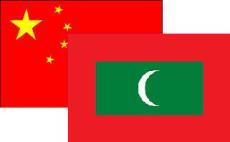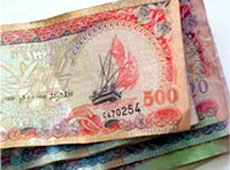Additional reporting by JJ Robinson
A leaked draft of a report into the Bank of Maldives’ (BML) lending practices prior to 2008 has identified those behind potentially destabilising breaches of both BML and Maldives Monetary Authority (MMA) guidelines.
The asset recovery investigation by forensic accounting company Grant Thornton, drawing on the 2008 Attorney General’s report on BML, concludes that it would have been “impossible for the [BML] board to not have been influenced” in the granting of significant exposures in the form of credit to a select coterie of Gayoom-era affiliates.
The document reveals well-connected individuals bypassing BML rules regarding the handling of non-performing assets, with a number of large companies belonging to politically-active businessmen continuing to receive credit despite failing to satisfactorily meet previous repayment obligations.
“The large exposures that BML held, were in the main, due to members of the board or their relatives,” the report found.
“Due to the fact that the largest exposures of the bank were from Board members and/or their families, it would be unrealistic for the Board to provide any clear independent review of the banking facilities provided, and would in [our] view form conflict of interest issues for those Board Members involved,” it added.
The report names a number of individuals and business groups who benefitted from the state bank’s loan and overdraft facilities towards the end of Maumoon Abdul Gayoom’s 30 year tenure as head of state.
The government was handed a US$10million (MVR 154.2 million) invoice from Grant Thornton last year in what former Foreign Minister Dr Ahmed Shaheed told Minivan News was a penalty fee for stopping the investigation initiated under Gayoom’s successor Mohamed Nasheed.
Prior to the alleged request from the current government to halt the investigation, Grant Thornton had uncovered evidence of an alleged US$800 million oil trade involving former head of the State Trading Organisation (STO) and current presidential hopeful Abdulla Yameen. Shaheed alleged that the accounting firm was contracted to receive a percentage of any assets recovered as a result of its work.
The private parties named in Grant Thorton’s BML assessment include the Sun Group, Lily Group, Sultans of the Seas, VA Group, Afeef Group, Villa Group, Thasmeen Ali, VB Group, and Rainbow.
“Many of the above parties benefited from loans that were used to assist in purchasing leases for resorts, related tourism businesses etc, of which would not have been achieved without the connections held by certain individuals,” the report said.
The report also makes particular mention of the role of Ibrahim Gasim, both Finance Minister and non-executive BML board member at the time of the majority of cases documented within the Grant Thornton report.
Gasim, who is also standing as the Jumhoree Party (JP) presidential candidate in next month’s election, would have been responsible for the appointment of the majority of the BML board at this time.
Grant Thornton’s report revealed that Gasim’s Villa Group had been loaned MVR481,299,571 (US$37,601,520) as of October 31st 2008, representing 32.4 percent of the bank’s entire capital.
This represents one of a number of examples of such exposure featured in the report, despite the Bank’s acquiescence in 2006 to an MMA request to reduce any credit guaranteed to individual or related group borrowers to 30 percent of overall capital.
After repeated lobbying, the MMA increased this amount to 40 percent. Grant Thornton suggested that this extension request was due to the fact that a number of the groups mentioned in its report were already exceeding the original lower limit.
In rejecting one of BML’s requests for an increased credit exposure limit, the MMA wrote that “such concentration of credit is far in excess of the legal lending limits of the bank and it could seriously threaten the bank’s position, and the stability of the whole financial sector,” the leaked document stated.
Even with this increase, Sun Group is reported to have exceeded this limit after January 2008, with loans and overdraft facilities reaching MVR 607,345,442 (US$46,879,400) as of 31 October 2008.
“This amounted to 40.8 percent of the Bank’s capital as at 31 October 2008,” the report observed.
Loans and overdraft facilities provided to Afeef Group totalled MVR 245,123,414 (US$19,150,266) as of October 31, 2008 – approximately 16.5 percent of BML’s total capital at the time.
Sun Group Chairman and majority shareholder Ahmed Shiyam’s Maldivian Development Alliance (MDA) meanwhile this week announced its decision to form a coalition the Progressive Party of Maldives (PPM), headed by former President Gayoom.
Alterations to BML’s internal loan approval mechanisms for board members in May 2007 resulted in the bypassing of the bank’s Credit Committee.
“This effectively meant that those Board Members that had applied for credit facilities were approving their own loans,” stated the draft report.
BML board members complicit in self-approving their own credit lines include Mohamed Ahmed Didi (Sultans Group shareholder), Ahmed Hamza (Director of the VA Group), and Gasim (Chairman of the Villa Group).
Director Mohamed Adil also features prominently, being cited in one particular example of a board meeting in which he approved the re-financing of the Sultan Group’s debt at the same time as being the group’s major director/shareholder.
BML’s recovery
In the intervening years, BML wrote off multiple toxic non-performing assets and returned to profitability, largely by outright ceasing to pay dividends to shareholders for almost five years.
The Bank’s board approved a MVR 50 million (US$3.23 million) interim dividend to shareholders in July 2013, the first since 2008.
“This marks the end of a painful and challenging journey that began in 2009 when the bank reported record level non-performing loans. However, in recent years Bank of Maldives has reported record level earnings and operating profit and the company returned to profit in 2012,” read a statement from BML.
BML’s former CEO Peter Horton, a UK banker appointed in February 2011 with extensive experience tackling distressed portfolios and problem lending across Africa as part of Barclay’s corporate turnaround team, resigned in August 2013 to head up Bermuda Commercial Bank.
“The profitability and dividend payment will be sustainable going forward,” said Horton in the bank’s July statement. “This is an interim dividend and at MVR 9.29 [a share] for the half year places us in a strong position to pay the highest full year dividend in the Bank’s recent history at year end”.
Download the leaked GT report
Likes (0)Dislikes
(0)Dislikes (0)
(0)  In September 2012, President Waheed told
In September 2012, President Waheed told  electricity and phone bills if funds were not transferred from the MVR 1.8 billion (US$117 million) Public Sector Investment Programme (PSIP).
electricity and phone bills if funds were not transferred from the MVR 1.8 billion (US$117 million) Public Sector Investment Programme (PSIP).